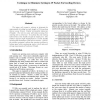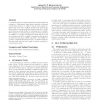35 search results - page 5 / 7 » The associative-skew clock routing problem |
ICCAD
2003
IEEE
14 years 4 months ago
2003
IEEE
As the clock frequencies used in industrial applications increase, the timing requirements imposed on routing problems become tighter. So, it becomes important to route the nets w...
ICCAD
2005
IEEE
14 years 4 months ago
2005
IEEE
— Although the LUT (look-up table) size of FPGAs has been optimized for general applications, complicated designs may contain a large number of cascaded LUTs between flip-flops...
ICCD
2004
IEEE
14 years 4 months ago
2004
IEEE
This paper will present a solution to eliminate the requirements of sorting by prefix length in IP forwarding devices using Ternary Content Addressable Memories (TCAMs). This will...
ICCD
2004
IEEE
14 years 4 months ago
2004
IEEE
The increasing clock frequencies in high-end industrial circuits bring new routing challenges that can not be handled by traditional algorithms. An important design automation pro...
DAC
2002
ACM
14 years 8 months ago
2002
ACM
Conventional global routing minimizes total wire length and congestion. Experiments using large industrial benchmark circuits show that up to 24% of nets in such routing solutions...


